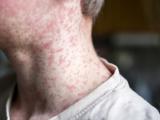Dec 21, 2012
FDA expands Tamiflu approval to include young babies
The US Food and Drug Administration (FDA) today expanded the approved use of oseltamivir (Tamiflu) to include babies as young as 2 weeks old who have had flu symptoms for no longer than 2 days. The drug isn't approved to prevent flu in this age-group. Until now, oseltamivir was approved to treat and prevent flu in children starting at the age of 1 year, with the proviso that treatment start within the first 2 days of illness. During the 2009 H1N1 pandemic the FDA approved an Emergency Use Authorization for oseltamivir in this age-group, which expired when federal officials terminated the public health emergency. The FDA said dosing for kids younger than 1 year must be calculated on the basis of the child's exact weight. The dosage is 3 milligrams per kilogram of body weight, twice a day for 5 days. The FDA also said the smaller doses will require a different dispenser from the one currently packaged with Tamiflu. Edward Cox, MD, MPH, director of the Office of Antimicrobial Products in the FDA’s Center for Drug Evaluation and Research, said pharmacists will need to provide the proper dispenser when filling prescriptions. The expanded approval for young babies is based on data extrapolation from studies in adults and older children and on additional safety and pharmacokinetic studies sponsored by the National Institutes of Health (NIH) and Roche, the maker of Tamiflu, the FDA explained. The agency noted that the drug's safety and efficacy haven't been established in infants younger than 2 weeks old.
Dec 21 FDA press release
Decree imposes new restrictions on tainted peanut butter producer
A federal district court judge in New Mexico has signed a consent decree filed by the US government requiring Sunland Inc., which produced peanut butter linked to a Salmonella Bredeney outbreak, to retain an independent sanitation expert and implement a control program, the US Food and Drug Administration (FDA) said today. The action, which includes other food safety steps, bars the company from processing and distributing food from its peanut butter plant or peanut mill in Portales, N.M., until it has complied with the consent agreement requirements. The company will also need written authorization from the FDA to resume operations. In a related development, the FDA said that based on the consent degree, it has lifted its suspension of Sunland's food facility registration imposed in late November. The consent decree allows the company to receive, hold, and distribute raw, unshelled peanuts bound for facilities that include a kill step to eliminate the pathogen. The FDA said the Salmonella outbreak linked to Sunland products sickened 42 people in 20 states.
Dec 21 FDA statement
Nov 27 CIDRAP News Scan "FDA bars operations at tainted peanut butter plant"
Measles cases in Europe drop from recent highs
The number of measles cases in European Union (EU) countries has fallen to levels that were typical before the large outbreaks of 2010 and 2011, according to a posting today from the European Centre for Disease Prevention and Control (ECDC). The case count so far in 2012 is 7,016, compared with about 30,000 in 2011. Cases this year have been concentrated in five countries, with France, Italy, Romania, Spain, and the United Kingdom accounting for 94%. Less than 1 case per million population over the past 12 months has been reported by 12 of 29 EU/European Economic Area countries, which is low enough to meet the elimination target set for 2015 by the World Health Organization (WHO). The elimination target for rubella has been met by 16 of 26 countries having national surveillance; 10 have had no cases at all. Romania's large rubella outbreak last season (more than 24,000 cases reported over the past 12 months) is also receding, with only 24 reported cases between August and October of this year.
Dec 21 ECDC release
Survey finds many countries still have rinderpest virus samples
A survey of 150 countries concerning riderpest virus stocks found that 44 labs in 35 countries are keeping lab-attenuated strains, field strains, or diagnostic samples, according to a report yesterday from researchers in England, Australia, and the United Nations Food and Agriculture Organization (FAO). They conducted the survey in 6 different languages in 2011 following the declaration that the livestock disease was eradicated and the establishment of a research moratorium. Their findings appeared in Emerging Infectious Diseases. In July the FAO and World Organization for Animal Health (OIE) called for labs to destroy any live rinderpest virus samples or send them to approved labs for safe storage. The authors said that though their findings probably underestimate the number of virus samples that still exist, it's clear that many countries still hold material containing the virus. They noted that some labs are still doing basic research, and they urged scientists to observe new compliance standards set by the OIE and FAO, which specify that the work should be done in a biosafety level 3 (BSL 3) setting. The group reported that some field veterinarians believed rinderpest vaccine might be useful in their regions in the future. The authors urged more awareness about the risk of disease reintroduction and the need to use vaccines only for managing confirmed outbreaks. Rinderpest and smallpox are the only diseases that have been eradicated.
Dec 20 Emerg Infect Dis report
Jul 23 CIDRAP News Scan "OIE, FAO call for destruction of rinderpest virus stores"
Murder of polio immunizers could be game-changer for eradication efforts
The attacks on healthcare workers in Pakistan seeking to vaccinate children against polio could be a "game changer" in the global polio eradication effort, according to public health experts quoted in a Nature news story today. Shootings in Pakistan have claimed nine workers' lives in the past few days in Karachi and the northwest province of Khyber Pakhtunkhwa, resulting in suspension of a 3-day vaccination campaign in some areas. A Global Polio Eradication Initiative (GPEI) official said the coalition intends to support a planned mid-January vaccination program in Pakistan. Continuation of the vaccination program during the current dry months is key, because the virus spreads less effectively in dry conditions, said Elias Durry, the World Health Organization's (WHO's) polio coordinator in Islamabad. Heidi Larson, a London anthropologist who studies vaccination, compared the current crisis to a 2003 immunization boycott in northern Nigeria, which allowed the virus to rebound there. She suggested that polio eradication efforts should be embedded in routine health services rather than singled out in specific campaigns. The killings have been widely condemned by Pakistani politicians and religious leaders, and Durry expressed a hope that the reaction to them will strengthen the country's determination to rid itself of polio. Pakistan is one of three countries where the disease is still endemic, with Afghanistan and Nigeria.
Dec 21 Nature article
Dec 21 CDC statement


















